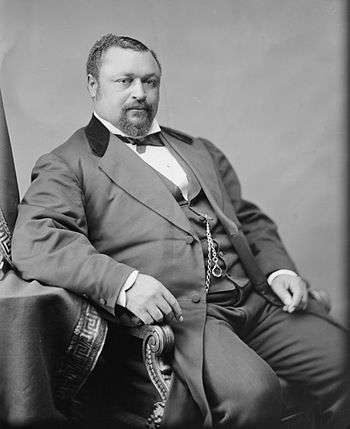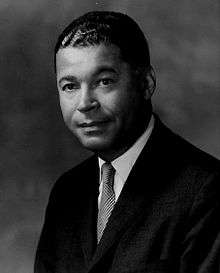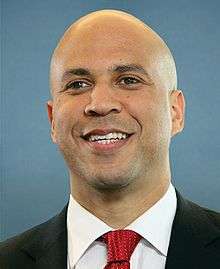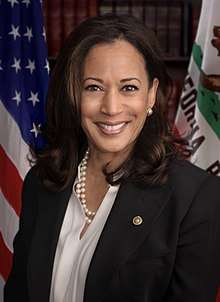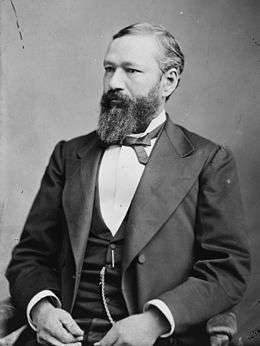List of African-American United States Senators


The United States Senate has had ten African-American elected or appointed office holders.[1] The United States Senate is the upper house of the bicameral United States Congress, which is the legislative branch of the federal government of the United States. The U.S. Census Bureau defines African Americans as citizens or residents of the United States who have origins in any of the black populations of Africa.[2] The term is generally used for Americans with at least partial ancestry in any of the original peoples of sub-Saharan Africa. During the founding of the federal government, African Americans were consigned to a status of second-class citizenship or enslaved.[3] No African American served in federal elective office before the ratification in 1870 of the Fifteenth Amendment to the United States Constitution. The Fifteenth Amendment prohibits the federal and state governments from denying any citizen the right to vote because of that citizen's race, color, or previous condition of servitude. Of the ten senators, six were popularly elected (including one that previously had been appointed by his state's governor), two were elected by the state legislature prior to the ratification of the Seventeenth Amendment to the United States Constitution in 1913 (which provides for the direct election of U.S. Senators by the people of each state), and two were appointed by a state Governor. The 113th United States Congress (2013–15) marked the first time that two African Americans served concurrently in the Senate.[4]
The first two African-American senators represented the state of Mississippi during the Reconstruction Era, following the American Civil War. Hiram Rhodes Revels, the first African American to serve, was elected by the Mississippi State Legislature to succeed Albert G. Brown, who resigned during the Civil War. Some Democratic members of the United States Senate opposed his being seated based on the court case Dred Scott v. Sandford (1857) by the Supreme Court of the United States, claiming that Revels did not meet the citizenship requirement, but the majority of Senators voted to seat him.[1] The Mississippi state legislature elected Blanche Bruce in 1875, but Republicans lost power of the Mississippi state legislature in 1876. Bruce was not elected to a second term in 1881.[1] In 1890 the Democratic-dominated state legislature passed a new constitution disfranchising most black voters. Every other Southern state also passed disfranchising constitutions by 1908, excluding African Americans from the political system in the entire former Confederacy. This situation persisted into the 1960s until after federal enforcement of constitutional rights under the Voting Rights Act of 1965.
The next black United States Senator, Edward Brooke of Massachusetts, took office in 1967. He was the first African American to be elected by popular vote after the ratification in 1913 of the Seventeenth Amendment to the United States Constitution, rather than to be elected by a state legislature.[1] The Seventeenth Amendment established direct election of United States Senators by popular vote.
Carol Moseley Braun and Barack Obama were both elected by the voters of Illinois, entering the Senate in 1993 and 2005, respectively.[1] Carol Moseley Braun is the first African-American woman to be elected - or appointed - to the Senate after the ratification in 1920 of the Nineteenth Amendment to the United States Constitution. The Nineteenth Amendment prohibits any United States citizen from being denied the right to vote on the basis of sex. While serving in the Senate, Obama became the first African American to be elected to the office of President of the United States.[5] Roland Burris, also an African American, was appointed to fill the remainder of the Senate term of President-elect Obama.[6]
The next two black Senators, Tim Scott of South Carolina and Mo Cowan of Massachusetts, were both appointed by governors to fill the terms of Jim DeMint and John Kerry, respectively, who had resigned their positions.[1] On October 16, 2013, citizens of New Jersey elected Cory Booker in a special election to fill the seat of the late Senator Frank R. Lautenberg.[7] Sworn into office on October 31, 2013, he is the first African-American Senator to be elected since Barack Obama in 2004 and the first to represent the state of New Jersey, later securing a full 6-year term in the 2014 mid-term elections. Senator Tim Scott retained his seat in a special election in 2014, also securing a full 6-year term in 2016. On January 3, 2017, Senators Scott and Booker were joined in the Senate by Kamala Harris of California, who was elected on November 8, 2016.[8] Senator Harris is the second African-American woman to serve in the U.S. Senate.
As of 3 January 2017, there have been 1,970 members of the United States Senate,[9] but only ten have been African American.[10][11] While 58 nationwide organizations exist to elect women to the United States Congress, including EMILY's List and the Susan B. Anthony List, no organization has been formed to elect African Americans to the United States Congress.[12]
List of African-American U.S. Senators
- Political parties
| Senator | State | Took office | Left office | Party | Congress | Ref. | Note | ||
|---|---|---|---|---|---|---|---|---|---|
| Hiram Rhodes Revels (1827–1901) |
Mississippi | February 25, 1870 | March 3, 1871 | Republican | 41st (1869–1871) |
[13][14] | [note 1] | ||
| Blanche Bruce (1841–1898) |
Mississippi | March 4, 1875 | March 3, 1881 | Republican | 44th (1875–1877) |
[15][16] | [note 2] | ||
| 45th (1877–1879) | |||||||||
| 46th (1879–1881) | |||||||||
| Edward Brooke (1919–2015) |
Massachusetts | January 3, 1967 | January 3, 1979 | Republican | 90th (1967–1969) |
[17] | [note 3] | ||
| 91st (1969–1971) | |||||||||
| 92nd (1971–1973) | |||||||||
| 93rd (1973–1975) | |||||||||
| 94th (1975–1977) | |||||||||
| 95th (1977–1979) | |||||||||
| Carol Moseley Braun (born 1947) |
Illinois | January 3, 1993 | January 3, 1999 | Democratic | 103rd (1993–1995) |
[18][19] | [note 4] | ||
| 104th (1995–1997) | |||||||||
| 105th (1997–1999) | |||||||||
| Barack Obama (born 1961) |
Illinois | January 3, 2005 | November 16, 2008 | Democratic | 109th (2005–2007) |
[5][20] | [note 5] | ||
| 110th (2007–2009) | |||||||||
| Roland Burris (born 1937) |
Illinois | January 15, 2009 | November 29, 2010 | Democratic | 111th (2009–2011) |
[6] | [note 6] | ||
| Tim Scott (born 1965) |
South Carolina | January 2, 2013 | Incumbent | Republican | 112th (2011–2013) |
[21][22] | [note 7] | ||
| 113th (2013–2015) | |||||||||
| 114th (2015–2017) | |||||||||
| 115th (2017–2019) | |||||||||
| Mo Cowan (born 1969) |
Massachusetts | February 1, 2013 | July 16, 2013 | Democratic | 113th (2013–2015) |
[23][24] | [note 8] | ||
| Cory Booker (born 1969) |
New Jersey | October 31, 2013 | Incumbent | Democratic | 113th (2013–2015) |
[7][25][26] | [note 9] | ||
| 114th (2015–2017) | |||||||||
| 115th (2017–2019) | |||||||||
| Kamala Harris (born 1964) |
California | January 3, 2017 | Incumbent | Democratic | 115th (2017–2019) |
[8][27][28] | [note 10] | ||
African Americans elected to the United States Senate, but not seated
- Political party
| Senator–elect | State | Took office | Left office | Party | Congress | Ref. | Note | ||
|---|---|---|---|---|---|---|---|---|---|
| P. B. S. Pinchback (1837–1921) |
Louisiana | Denied seat | Republican | 44th (1875–1877) |
[31] | [note 11] | |||
See also
- Federal government
- African Americans in the United States Congress
- List of African-American United States Cabinet Secretaries
- State and local government
Notes
- ↑ Retired from office. Elected to complete an unfinished term after Mississippi was readmitted into the Union on February 23, 1870. First African American to serve in the United States Senate and Congress. First African American to serve in Congress from Mississippi.[13]
- ↑ Retired from office. First African American to serve a full six-year term as a United States Senator. The only Senator to be a former slave.[16]
- ↑ Lost office during reelection. First African American elected to the Senate by direct election. First African American to serve in Congress from Massachusetts.[17]
- ↑ Lost office during reelection. First African-American female and African-American Democrat to serve in the United States Senate.[18]
- ↑ Resigned from office following election to the presidency of the United States. First African-American President of the United States.[5]
- ↑ Appointed by Illinois Governor Rod Blagojevich to fill vacancy caused by the resignation of President-elect Barack Obama. Not a candidate during special election following his appointment. First African American to succeed another African American in the Senate.[6]
- ↑ Appointed by South Carolina Governor Nikki Haley to fill vacancy caused by the resignation of Jim DeMint. First African American to serve in both chambers of the United States Congress.
- ↑ Appointed by Massachusetts Governor Deval Patrick to fill vacancy caused by the resignation of John Kerry. Not a candidate during special election following his appointment. First African-American Senator appointed by an African-American Governor. The first African American to serve alongside another African-American Senator - Tim Scott.
- ↑ Elected to fill vacancy caused by the death of Frank Lautenberg. First African American to be elected to the Senate by special election.
- ↑ First African American to serve in the Senate from California.[8] Harris is the child of a Caribbean-born father and India-born mother.[29] Other African Americans who were elected to Congress and were born in the Caribbean or to Caribbean-born parents include Rep. Shirley Chisholm, Rep. Yvette D. Clarke, Del. Stacey Plaskett, Rep. Mia Love, Del. Melvin H. Evans, Del. Donna Christian-Christensen, and Del. Victor O. Frazer. Shirley Chisholm is the child of Caribbean-born parents and is the first African-American woman to be elected to Congress.[30]
- ↑ Denied seat due to a contested election that involved William L. McMillen.
References
- 1 2 3 4 5 6 Wiersema, Alisa (February 1, 2013). "Reconstruction and Beyond: The 8 African-American Senators". ABC News. Retrieved February 9, 2013.
- ↑ "The Black Population: 2010" (PDF). United States Census Bureau. Retrieved December 18, 2015.
- ↑ "Time Line of African American History, 1881-1900". Library of Congress. Retrieved October 22, 2007.
- ↑ Weigel, David (January 30, 2013). "For the First Time Ever, We'll Have Two Black Senators Serving at the Same Time". Slate Magazine. Retrieved January 30, 2013.
- 1 2 3 "Obama, Barack, (1961–)". Biographical Directory of the United States Congress. United States Congress. Retrieved January 25, 2009.
- 1 2 3 "Burris, Roland, (1937–)". Biographical Directory of the United States Congress. United States Congress. Retrieved January 25, 2009.
- 1 2 Walshe, Shushannah (January 30, 2013). "Cory Booker Wins Race for US Senate Seat in New Jersey". ABC News. Retrieved October 16, 2013.
- 1 2 3 Willon, Phil (November 9, 2016). "Kamala Harris is Elected California's New U.S. Senator". LA Times. Retrieved November 18, 2016.
- ↑ "Senators of the United States: 1789-present" (PDF). Senate Historical Office. April 17, 2015. p. 90. Retrieved 5 August 2015.
- ↑ "Ethnic Diversity in the Senate". Senate Historical Office. Retrieved 19 October 2013.
- ↑ Desjardins, Lisa (April 4, 2012). "No African-American senators likely in near future". CNN.com. Retrieved February 9, 2013.
- ↑ Terkel, Amanda (27 September 2012). "Senate Likely To Remain Without Black Members For Years". Huffington Post. Retrieved February 9, 2013.
- 1 2 "Revels, Hiram Rhodes, (1827–1901)". Biographical Directory of the United States Congress. United States Congress. Retrieved January 25, 2009.
- ↑ "First African American Senator". Historical Minutes Essays, 1878–1920. Senate Historical Office. Retrieved January 4, 2013.
- ↑ "Bruce, Blanche Kelso, (1841 - 1898)". Biographical Directory of the United States Congress. United States Congress. Retrieved January 25, 2009.
- 1 2 "Former Slave Presides over Senate". Historical Minutes Essays, 1878–1920. Senate Historical Office. Retrieved January 4, 2013.
- 1 2 "Brooke, Edward William, III, (1919–)". Biographical Directory of the United States Congress. United States Congress. Retrieved January 25, 2009.
- 1 2 "Moseley Braun, Carol, (1947–)". Biographical Directory of the United States Congress. United States Congress. Retrieved January 25, 2009.
- ↑ "Carol Moseley Braun". Senate Historical Office. Archived from the original on December 17, 2012. Retrieved January 4, 2013.
- ↑ "Barack Obama". Senate Historical Office. Retrieved January 4, 2013.
- ↑ "Scott, Tim, (1965–)". Biographical Directory of the United States Congress. United States Congress. Retrieved November 18, 2014.
- ↑ Blake, Aaron; Cillizza, Chris (December 17, 2012). "Nikki Haley appoints Rep. Tim Scott to Senate". The Washington Post. Retrieved January 5, 2013.
- ↑ "Cowan, William (Mo), (1969–)". Biographical Directory of the United States Congress. United States Congress. Retrieved November 18, 2014.
- ↑ Phillips, Frank (January 30, 2013). "William 'Mo' Cowan is Governor Deval Patrick's pick to serve as interim US senator". Boston Globe. Retrieved January 30, 2013.
- ↑ "Booker, Cory Anthony, (1969–)". Biographical Directory of the United States Congress. United States Congress. Retrieved November 18, 2014.
- ↑ Giambusso, David (October 23, 2013). "Cory Booker planning to be sworn in to Senate on Halloween". The Star-Ledger. NJ.com. Retrieved October 26, 2013.
- ↑ "Harris, Kamala Devi, (1964 - )". Biographical Directory of the United States Congress. United States Congress. Retrieved June 27, 2018.
- ↑ Sources for label "African American" or "black" include:
- "African American Senators". United States Senate. Retrieved 1 July 2018.
Kamala D. Harris (D-CA) became the first African American to represent California in the United States Senate on January 3, 2017.
- "Kamala Harris's File". PolitiFact. Retrieved 1 July 2018.
Harris, a Democrat, was elected to the U.S. Senate in 2016. She became California's attorney general in January 2011. She was the first woman and the first African-American to hold the office in California's history.
- Weigel, David (January 9, 2018). "Democrats Add Harris, Booker to Senate Judiciary Committee". The Washington Post. Retrieved 1 July 2018.
The Senate Judiciary Committee will welcome its first African American members in this century after Democrats added Sens. Kamala D. Harris (D-Calif.) and Cory Booker (D-N.J.) to the panel that handles judicial nominations and appointments to the Justice Department.
- Wire, Sarah D. (November 8, 2016). "Kamala Harris Will Be the First Indian American U.S. Senator and California's First Black Senator". Los Angeles Times. Retrieved 1 July 2018.
She will also be just the second black woman to serve in the U.S. Senate, and the first black senator from California.
- McPhate, Mike (September 29, 2016). "California Today: A Snooze of a Senate Race". The New York Times. Retrieved 2 July 2018.
The race to succeed Senator Barbara L. Boxer of California was supposed to be one of the marquee contests of the year ... It offers a window into the ethnic kaleidoscope that is California: Pitting a Latino, Representative Loretta Sanchez, against an African-American, Kamala Harris, the state attorney general.
- DeMarche, Edmund (April 6, 2018). "Sen. Kamala Harris Raises Eyebrows on 'Ellen' With Trump Joke". Fox News. Retrieved 2 July 2018.
Harris, California’s first African-American senator, has not responded to the conservative response online.
- "African American Senators". United States Senate. Retrieved 1 July 2018.
- ↑ Wire, Sarah D. (November 8, 2016). "Kamala Harris Will Be the First Indian American U.S. Senator and California's First Black Senator". Los Angeles Times. Retrieved 1 July 2018.
Harris’ mother, Dr. Shyamala Harris, emigrated from India. Her father, Donald Harris, emigrated from Jamaica.
- ↑ Wasniewski, Matthew, ed. (2008). "Shirley A. Chisholm 1924 — 2005". Black Americans in Congress, 1870-2007. United States Government Printing Office. p. 340. ISBN 9780160801945.
- ↑ Office of the Historian. "'Crafting an Identity,' Fifteenth Amendment in Flesh and Blood". Office of the Clerk, House of Representatives of the United States. Retrieved August 7, 2013.
Further reading
- Christopher, Maurine (1971). America's Black Congressmen. Thomas Y. Crowell Company. ISBN 9780690085853.
- Clay, William L. (1992). Just Permanent Interests: Black Americans in Congress, 1870–1991. Amistad Press. ISBN 1-56743-000-7.
- Dray, Philip (2008). Capitol Men: The Epic Story of Reconstruction Through the Lives of the First Black Congressmen. Houghton Mifflin. ISBN 978-0-618-56370-8.
- Foner, Eric (1996). Freedom's Lawmakers: A Directory of Black Officeholders During Reconstruction. LSU Press. ISBN 9780807120828.
- Freedman, Eric; Jones, Stephen A. (2008). African Americans In Congress: A Documentary History. CQ Press. ISBN 9780872893856.
- Gill, LaVerne McCain (1997). African American Women in Congress: Forming and Transforming History. Rutgers University Press. ISBN 9780813523538.
- Hahn, Steven (2005). A Nation Under Our Feet: Black Political Struggles in the Rural South from Slavery to the Great Migration. Belknap Press of Harvard University Press. ISBN 9780674017658.
- Haskins, James (1999). Distinguished African American Political and Governmental Leaders. Oryx Press. ISBN 9781573561266.
- Lynch, Matthew (2012). Before Obama: A Reappraisal of Black Reconstruction Era Politicians. ABC-CLIO. ISBN 9780313397929.
- Middleton, Stephen (2002). Black Congressmen During Reconstruction: A Documentary Sourcebook. Greenwood Publishing Group. ISBN 9780313322815.
- Rabinowitz, Howard N., ed. (1982). Southern Black Leaders of the Reconstruction Era. University of Illinois Press. ISBN 9780252009723.
- Walton, Jr., Hanes; Puckett, Sherman C.; Deskins, Jr., Donald R. (2012). The African American Electorate: A Statistical History. Congressional Quarterly Press. ISBN 9780872895089.
- Wasniewski, Matthew, ed. (2008). Black Americans in Congress, 1870-2007. United States Government Printing Office. ISBN 9780160801945. The website, Black Americans in Congress maintained by the Clerk of the United States House of Representatives, serves as an ongoing supplement to the book. To download a free copy of the entire publication or a specific portion of the publication, see H. Doc. 108-224 - Black Americans in Congress 1870 - 2007. Made available by the United States Government Printing Office (GPO).
External links
- "African American Senators". United States Senate. Retrieved 2 July 2018.
- African American Members of the United States Congress: 1870–2012 A 66-page history produced by the Congressional Research Service, a legislative branch agency within the Library of Congress.
- Biographical Directory of the United States Congress, 1774 - Present Perform search of desired Representative or Delegate by last name, first name, position, state, party, by year or congress.
- Black Americans in Congress, 1870–2007 A C-SPAN video with Matt Wasniewski, historian of the United States House of Representatives, as the presenter. He discusses the history of African Americans in Congress from 1870 to 2007. The video is 164 minutes in length.
- Black Americans in Congress Maintained by the Clerk of the United States House of Representatives. The website serves as an ongoing supplement to the book, Black Americans in Congress, 1870-2007.
- Major African American Office Holders Since 1641 Includes a listing for the United States Senate. Maintained by Blackpast.org.
.png)
